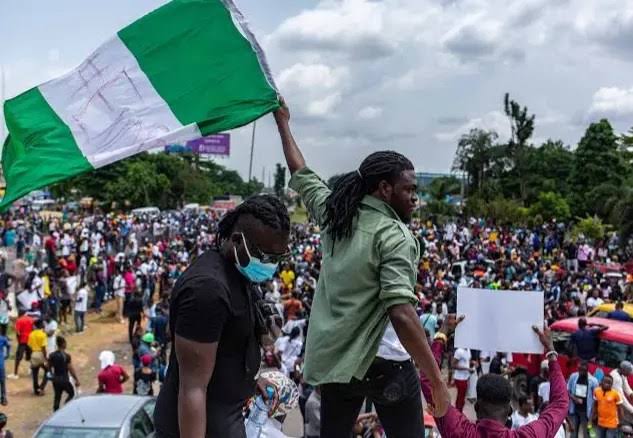Democracy in chains: Nigeria’s urgent call for electoral reform

Photo of Nigerian youths protesting in the #EndBadGovernance protest of 2024. Photo Credit- Premium Times
A couple of days ago, a powerful image and message was spread across X from the account of @Peter4Nigeria: “DEMOCRACY IS IN CHAINS.” The graphic, featuring a person shackled behind bars with a ballot box, together with the rallying cry for transparent and accountable elections, all shows a growing sentiment among Nigerians, a deep frustration with the state of the nation’s electoral system. The hashtags #ElectoralReform, #FixINEC, and #NoElectoralReformNoElection shows a movement that has gained momentum, reflecting the collective suffering of Nigerians yearning for a democracy that truly represents their will.
Public reactions for electoral reforms
This post, shared by @Peter4Nigeria, is more than a social media outcry; it is a clarion call to the Nigerian Senate and a broader appeal to citizens to demand reform of the Independent National Electoral Commission (INEC). The accompanying replies on X reveal a cross-section of Nigerian voices, some supportive, others skeptical, highlighting the complexity of the issue. @AdebayoAyo45952’s post, with an image of raised fists and the Nigerian flag, emphasizes a “30-day countdown” for action, while @Roughdiamond_04 expresses doubt, calling the judiciary and legislature “cowards” unlikely to act. Nigeria’s electoral history since the return to democracy in 1999 has been a turbulent one, marred by irregularities that have reduced public trust. As noted in several Nigerian media platforms and according to political critics, the 2023 general elections exposed persistent issues: vote buying, falsification of results, and a lack of attitudinal change among politicians.
These reports and claims argue that a fundamental shift in politicians’ behavior, demonstrating genuine commitment to democratic values is critical to restoring confidence in the electoral process. Yet, the legal framework governing elections remains a battleground. The Supreme Court’s 2023 ruling, which dismissed challenges to President Tinubu’s victory over INEC’s failure to electronically transmit results, highlighted a glaring gap in the Electoral Act 2022. The court ruled that electronic transmission wasn’t legally mandated, a decision that further fueled public criticism with INEC’s ability to innovate and ensure transparency.
RELATED STORIES
Nigerian Democracy and the Fading Light of Integrity
Old age myth stifling youths’ inclusion in Nigerian politics — Kelechi, CEO, Guardians Impact Intl
ANALYSIS: Why 2023 elections may increase ‘japa’, voter apathy among youths
The X post’s probably represents a civic organization pushing for electoral reform. Its imagery of democracy in chains resonates deeply in a country where elections often feel like a fairytale to many. Previous studies on Nigeria’s 2023 elections points to systemic issues: vote buying thrives in a society where poverty makes citizens vulnerable to inducements, and illiteracy complicates the adoption of electoral technologies. The study also notes that a robust middle class could drive electoral integrity by demanding accountability, but Nigeria’s economic hardship slows this progress.
Social media, as seen in this X thread, has become a double-edged sword in Nigeria’s democratic struggle. On one hand, platforms like X makes voices like @Peter4Nigeria’s louder, enabling grassroots movements to pressure authorities. Replies from users like @Sideone100, who tags activist @YeleSowore to lend his voice to this cause instead of attacking political elites, show how social media foster solidarity. On the other hand, researches on disinformation in Nigeria warns that social media also promotes divisions, with fake news and unverified content. However this post seems different as it purely intends to improve Nigeria’s democracy in the aspect of free, fair, and credible elections.
Well, the demand for electoral reform by @Peter4Nigeria is not the first. INEC and the National Assembly have made patches on election laws before and after every general election since 1999, but these efforts have often been irrelevant, failing to address core issues like INEC’s independence and the enforcement of its regulations. Political analysts call for explicitly stating the legal status of INEC’s guidelines in the Electoral Act to safeguard its autonomy and facilitate innovations like electronic voting measures that could prevent the kind of controversies that plagued the 2023 elections.
However, the road to a possible electoral reform is not a roller coaster ride but one filled with challenges. @Roughdiamond_04’s skepticism on X reflects a broader sentiment: a lack of faith in the political class to enact meaningful change. The judiciary’s reluctance to challenge INEC’s shortcomings, as seen in the 2023 Supreme Court ruling, and the Legislature’s slow pace in amending electoral laws, leave many Nigerians feeling trapped like the figure in the “Democracy in Chains” graphic poster.
Conclusion
More light on this discourse needs to be shed but it is best to draw the curtain close now. As the #30dayscountdown hashtag suggests, Nigerians are growing impatient. The movement for electoral reform is a litmus test for the country’s democracy. Will the Senate heed the call, or will democracy remain in chains? The answer lies not just in legislative action, but in a collective attitudinal shift among politicians, citizens, and electoral institutions to prioritize the will of the people over power and profit. Until then, the chains on Nigeria’s democracy will remain a clear symbol of a nation’s unfulfilled potential.

